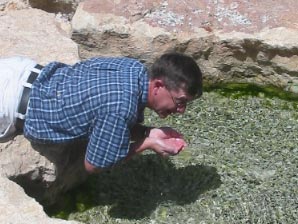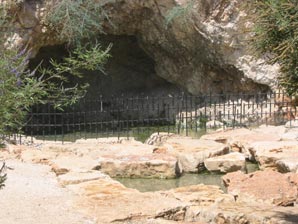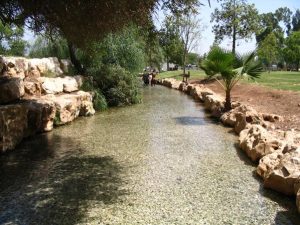by Bruce Okkema
“Gideon said to God, “If you will save Israel by my hand as you have promised – I will place a wool fleece on the threshing floor. If there is dew only on the fleece and all the ground is dry, then I will know that you will save Israel by my hand, as you said.” And that is what happened. Gideon rose early the next day; he squeezed the fleece and wrung out the dew – a bowlful of water. Then Gideon said to God, “Do not be angry with me. Let me make just one more request. Allow me one more test with the fleece. This time make the fleece dry and the ground covered with dew.” That night God did so. Only the fleece was dry; all the ground was covered with dew. – Judges 6:36 – 40
Many of us know that using the idiom “putting out your fleece” is a way of saying that a person is testing something. Those who are familiar with the Old Testament will know that the phrase comes from this story in Judges 6. Gideon knew how miraculous such a thing would be, because when there is dew in Israel it is very heavy and it drenches everything (see “The Refreshment of Dew”), yet when it is dry, it is bone dry. For the fleece to have been in the opposite condition as all of its surroundings could only have been so by the hand of God. Amazing as this was, there is much more to the story when we consider the whole context.
The Israelites had fallen into the worship of Baal and Asherah, gods of the peoples around them, and just as the Lord had warned, he had oppressed them for it. The Israelites had to resort to hiding in caves and mountain clefts to survive. They were totally dependent on their crops and animals, but yet for seven years in a row,
Whenever the Israelites planted their crops, the Midianites, Amalekites and other eastern peoples invaded the country. They camped on the land and ruined the crops all the way to Gaza and did not spare a living thing for Israel, neither sheep nor cattle nor donkeys. They came up with their livestock and their tents like swarms of locusts. It was impossible to count the men and their camels; they invaded the land to ravage it. (Judges. 6:3–5)
Imagine how terrifying this must have been! It was the Amalekites who had enraged the Lord by attacking the weak, and elderly, and stragglers as the Israelites were exiting Egypt, and they were known for their violence and cruelty. When the people cried to the Lord for mercy, he responded by reminding them of his delivery from their bondage in Egypt.
I brought you up out of Egypt, out of the land of slavery. I snatched you from the power of Egypt and from the hand of all your oppressors. I drove them from before you and gave you their land. I said to you, `I am the LORD your God; do not worship the gods of the Amorites, in whose land you live.’ But you have not listened to me.” (Jdg. 6:9-10)
 There are so many more lessons one can learn from the land – just in this story! When you read the entire passage, notice all of the imagery intended to remind you of God’s faithfulness in the past, and all that points ahead to his redemption in the future: delivery from Egypt, the angel of the Lord, miraculous signs, a meal, unleavened bread, a rock, a staff, fire, a threshing floor, a wine press, tearing down the altars, sacrifices, shouts, shofars, a dream, and so much more than just a fleece.
There are so many more lessons one can learn from the land – just in this story! When you read the entire passage, notice all of the imagery intended to remind you of God’s faithfulness in the past, and all that points ahead to his redemption in the future: delivery from Egypt, the angel of the Lord, miraculous signs, a meal, unleavened bread, a rock, a staff, fire, a threshing floor, a wine press, tearing down the altars, sacrifices, shouts, shofars, a dream, and so much more than just a fleece.
It is good to be reminded of how patient, powerful, and faithful our God is. He will defeat the forces of evil whenever he chooses. But contrary to our way of thinking, he does it by using faithful people who may be “slow of speech,” or shepherds, or farmers, or the son of a carpenter. To his glory, he can make mighty warriors out of all of us who may be least in our families and from the weakest of clans (vs. 6:12, 15.)
Two views of the spring of Harod, where Gideon and his men camped. (Judges 7:1)
Please read all of Judges 6 & 7 with an attentive ear and you hear the history of Israel ringing through it.



